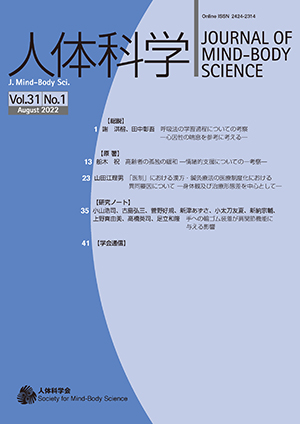Volume 31, Issue 1
Displaying 1-7 of 7 articles from this issue
- |<
- <
- 1
- >
- >|
Cover
-
Article type: Contents
2022Volume 31Issue 1 Pages 0
Published: August 15, 2022
Released on J-STAGE: August 28, 2022
Download PDF (796K)
Review Article
-
Article type: review-article
2022Volume 31Issue 1 Pages 1-12
Published: August 15, 2022
Released on J-STAGE: August 28, 2022
Download PDF (896K)
Original Research Papers
-
Article type: Origianl Research Papers
2022Volume 31Issue 1 Pages 13-22
Published: August 15, 2022
Released on J-STAGE: August 28, 2022
Download PDF (508K) -
Article type: Origianl Research Papers
2022Volume 31Issue 1 Pages 23-34
Published: August 15, 2022
Released on J-STAGE: August 28, 2022
Download PDF (705K)
Reserach Note
-
Article type: Research Note
2022Volume 31Issue 1 Pages 35-40
Published: August 15, 2022
Released on J-STAGE: August 28, 2022
Download PDF (751K)
SMBS Information
-
Article type: SMBS Information
2022Volume 31Issue 1 Pages 41
Published: August 15, 2022
Released on J-STAGE: August 28, 2022
Download PDF (83K)
Colophon
-
Article type: colophon
2022Volume 31Issue 1 Pages 42
Published: August 15, 2022
Released on J-STAGE: August 28, 2022
Download PDF (35K)
- |<
- <
- 1
- >
- >|
